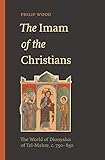The Imam of the Christians : The World of Dionysius of Tel-Mahre, c. 750–850 / Philip Wood.
Material type: TextPublisher: Princeton, NJ : Princeton University Press, [2021]Copyright date: ©2021Description: 1 online resource (272 p.) : 2 mapsContent type:
TextPublisher: Princeton, NJ : Princeton University Press, [2021]Copyright date: ©2021Description: 1 online resource (272 p.) : 2 mapsContent type: - 9780691219950
- Christian philosophy -- Islamic influences
- Christianity and other religions -- Islam
- Islam -- Relations -- Christianity
- Jacobites (Syrian Christians)
- Jacobites (Syrian Christians)
- RELIGION / History
- Abbasid revolution
- Abbasids
- Arab conquests
- Christian Muslim relations
- Christianity in Muslim societies
- Christianity under Muslim rule
- Cyrrhus
- Egyptian Christianity
- Egyptian Christians
- Fitna
- Harran
- Jacobites
- Kakushta
- Miaphysites
- Mosul
- Shuubiya
- Suryaye
- Syriac historiography
- Takrit
- bishops
- canon law
- dhimma
- medieval history
- monasteries
- patriarchate
- post Roman aristocrats
- BX179.D56 W66 2021
- online - DeGruyter
| Item type | Current library | Call number | URL | Status | Notes | Barcode | |
|---|---|---|---|---|---|---|---|
 eBook
eBook
|
Biblioteca "Angelicum" Pont. Univ. S.Tommaso d'Aquino Nuvola online | online - DeGruyter (Browse shelf(Opens below)) | Online access | Not for loan (Accesso limitato) | Accesso per gli utenti autorizzati / Access for authorized users | (dgr)9780691219950 |
Browsing Biblioteca "Angelicum" Pont. Univ. S.Tommaso d'Aquino shelves, Shelving location: Nuvola online Close shelf browser (Hides shelf browser)

|

|

|

|

|

|

|
||
| online - DeGruyter How Literatures Begin : A Global History / | online - DeGruyter Maria Theresa : The Habsburg Empress in Her Time / | online - DeGruyter The Last Embassy : The Dutch Mission of 1795 and the Forgotten History of Western Encounters with China / | online - DeGruyter The Imam of the Christians : The World of Dionysius of Tel-Mahre, c. 750–850 / | online - DeGruyter A War on Global Poverty : The Lost Promise of Redistribution and the Rise of Microcredit / | online - DeGruyter When Bad Thinking Happens to Good People : How Philosophy Can Save Us from Ourselves / | online - DeGruyter Alternative Conceptions of Civil Society / |
Frontmatter -- Contents -- Acknowledgements -- Introduction -- 1 Lay Elites under Arab Rule -- 2 Patriarchs and Bishops -- 3 Tithes, Authority and Hierarchy, 740–840 -- 4 Changing Centres of Power -- 5 Takrit and Mosul -- 6 Worldviews and Communal Boundaries -- 7 Dionysius and al-Maʾmun -- 8 Patriarchate and Imamate -- 9 Conceptions of Suryaya Identity in the Sixth to Ninth Centuries -- Conclusions -- Regnal Tables -- List of Fragments of Dionysius of Tel-Mahre -- Bibliography -- Index
restricted access online access with authorization star
http://purl.org/coar/access_right/c_16ec
How Christian leaders adapted the governmental practices and political thought of their Muslim rulers in the Abbasid caliphateThe Imam of the Christians examines how Christian leaders adopted and adapted the political practices and ideas of their Muslim rulers between 750 and 850 in the Abbasid caliphate in the Jazira (modern eastern Turkey and northern Syria). Focusing on the writings of Dionysius of Tel-Mahre, the patriarch of the Jacobite church, Philip Wood describes how this encounter produced an Islamicate Christianity that differed from the Christianities of Byzantium and western Europe in far more than just theology. In doing so, Wood opens a new window on the world of early Islam and Muslims’ interactions with other religious communities.Wood shows how Dionysus and other Christian clerics, by forging close ties with Muslim elites, were able to command greater power over their coreligionists, such as the right to issue canons regulating the lives of lay people, gather tithes, and use state troops to arrest opponents. In his writings, Dionysius advertises his ease in the courts of Abdallah ibn Tahir in Raqqa and the caliph al-Ma’mun in Baghdad, presenting himself as an effective advocate for the interests of his fellow Christians because of his knowledge of Arabic and his ability to redeploy Islamic ideas to his own advantage. Strikingly, Dionysius even claims that, like al-Ma’mun, he is an imam since he leads his people in prayer and rules them by popular consent.A wide-ranging examination of Middle Eastern Christian life during a critical period in the development of Islam, The Imam of the Christians is also a case study of the surprising workings of cultural and religious adaptation.
Mode of access: Internet via World Wide Web.
In English.
Description based on online resource; title from PDF title page (publisher's Web site, viewed 27. Jan 2023)


